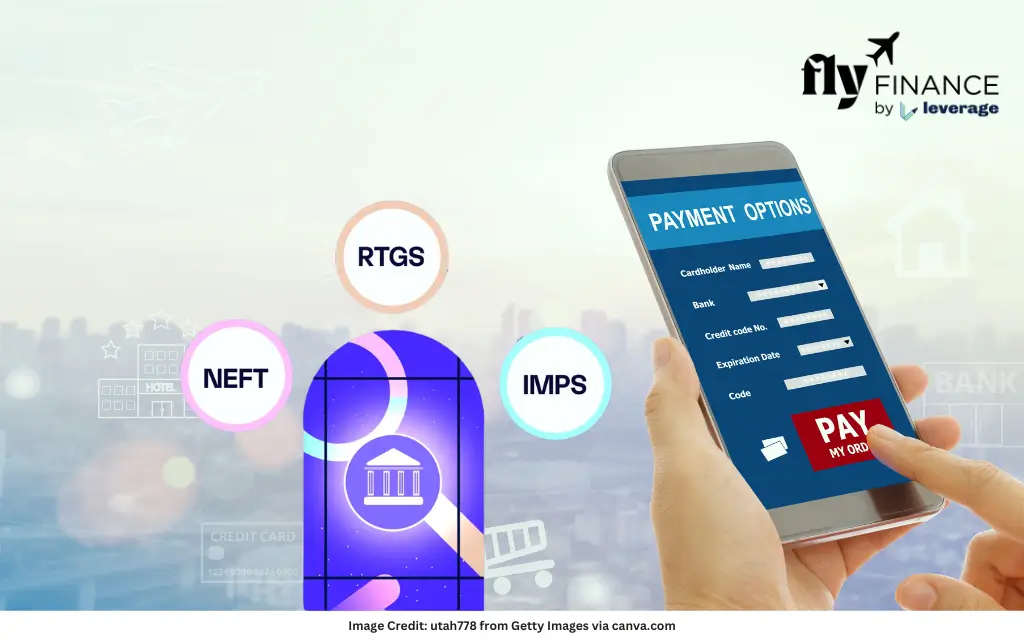In today’s digital era, electronic fund transfers have become a crucial part of banking. When transferring money online, three primary payment systems in India dominate the landscape: NEFT, RTGS, and IMPS. But what is the difference between NEFT, RTGS, and IMPS, and which one should you use for your transactions?
In this guide, we will understand the key differences between NEFT, RTGS, and IMPS, their key features, benefits, and limitations of each system to help you make an informed decision.
Table of contents
- What is the Difference Between NEFT, RTGS, and IMPS?
- What is NEFT? (National Electronic Funds Transfer)
- What is RTGS? (Real-Time Gross Settlement)
- What is IMPS? (Immediate Payment Service)
- NEFT, RTGS and IMPS: Which Payment Method Should You Choose?
- Security Tips for NEFT RTGS IMPS Money Transfers
- FAQs on Difference Between NEFT, RTGS, & IMPS
What is the Difference Between NEFT, RTGS, and IMPS?
The key differences between NEFT, RTGS, and IMPS lie in their transaction speed, purpose, and limits. NEFT processes transactions in batches, making it ideal for non-urgent payments.
On the other hand, RTGS is designed for high-value transactions above INR 2 lakh, ensuring real-time processing.
For quick and small-to-medium fund transfers, IMPS is the best choice. Available 24/7, IMPS enables instant money transfers, even on weekends and holidays.
The table below provides a clear breakdown of the key differences between NEFT RTGS IMPS which are widely used electronic fund transfer methods.
Whether you require a batch-processed transaction, an instant high-value transfer, or quick small-value payments, this table will help you choose the best option based on your needs.
| Feature | NEFT | RTGS | IMPS |
| Settlement Type | Batch Processing (Half-hourly) | Real-Time Transaction | Instant Transaction |
| Availability | 24×7, 365 days | 24×7, 365 days | 24×7, 365 days |
| Transaction Speed | It can take a few hours | Instant | Instant |
| Minimum Limit | No minimum | INR 2 lakh | No minimum |
| Maximum Limit | No upper limit | No upper limit | Varies by bank (usually INR 5 lakh) |
| Payment mode | Both Online & Offline | Both Online & Offline | Online |
| Transaction Charges | Free for online; branch fees may apply | Free for online; branch fees may apply | Varies by bank |
| Best For | Salary, regular payments | High-value business payments | Small, quick transactions |
Now that you have an idea of the differences between NEFT, RTGS, and IMPS from the table above, let’s understand each of them in detail, one by one.
Also Read: IFSC Full Form: Indian Financial System Code
What is NEFT? (National Electronic Funds Transfer)
NEFT full form is National Electronic Funds Transfer, which is an electronic payment system that enables seamless interbank fund transfers in India. It is widely used for bank transactions, salary payments, loan repayments, and online purchases.
Features of NEFT:
- Processing Mode: Operates in half-hourly batches, meaning transactions are carried out in scheduled batches rather than in real time.
- Availability: Available 24×7, 365 days, including bank holidays.
- Transaction Limits: No minimum or maximum transfer limit.
- Processing Charges: Online NEFT transactions are free, but branch-based transactions may incur nominal fees.
Advantages of NEFT:
- Cost-effective: A preferred mode for bulk transactions due to low or zero charges.
- Secure and Reliable: Regulated by the Reserve Bank of India (RBI).
- Widely Accepted: Almost all Indian banks support NEFT.
Disadvantages of NEFT:
- Not Real-Time: As it operates in batches, transactions may take time to process.
- Requires Bank Support: Both sender and receiver banks must be NEFT-enabled.
What is RTGS? (Real-Time Gross Settlement)
RTGS full form is Real-Time Gross Settlement, it is designed for large-value transactions that need immediate processing. It processes fund transfers in real-time. It is a fund transactions system that ensures quick and secure money movement.
Features of RTGS:
- Processing Mode: Real-time transaction settlement.
- Availability: 24×7, all year round.
- Transaction Limits: Minimum INR 2 lakh, no upper limit.
- Processing Charges: Free for online transactions; nominal fees may apply for branch transactions.
Advantages of RTGS:
- Instant Settlement: Unlike NEFT, RTGS processes transactions immediately.
- Safe for High-Value Transfers: Best suited for business payments, real estate transactions, and large remittances.
- Highly Secure: Regulated by the RBI, reducing fraud risks.
Disadvantages of RTGS:
- Minimum Limit: Not suitable for small payments, as the minimum transfer limit is INR 2 lakh.
- Bank Dependency: Both banks must be RTGS-enabled.
What is IMPS? (Immediate Payment Service)
The full form of IMPS is Immediate Payment Service. It is a quick and instant money transfer service available 24×7, including weekends and holidays. It allows customers to send and receive money instantly via mobile banking, internet banking, and ATMs.
Features of IMPS:
- Processing Mode: Real-time money transfer.
- Availability: Available round the clock.
- Transaction Limits: No minimum limit; the maximum limit varies across banks (usually up to INR 5 lakh).
- Processing Charges: Charges vary by bank, but many provide free transactions.
Advantages of IMPS:
- Fastest Payment Method: Transfers funds instantly, anytime, anywhere.
- Multiple Access Modes: Available through mobile banking, ATMs, and SMS banking.
- Best for Small to Medium Transactions: Ideal for daily payments like bill payments, shopping, and peer-to-peer transfers.
Disadvantages of IMPS:
- Transaction Limits: Maximum limits can be restrictive for large transfers.
- Bank Fees: Some banks may charge fees for IMPS transactions.
NEFT, RTGS and IMPS: Which Payment Method Should You Choose?
Choosing between NEFT, RTGS, and IMPS depends on the type of transaction, its urgency, the amount involved and accessibility. Let’s understand which payments you should choose.
- Use NEFT if you need a low-cost, reliable method for non-urgent fund transfers.
- Use RTGS if you are making a high-value transaction (INR 2 lakh+) that requires instant processing.
- Use IMPS if you need instant money transfers for small to medium transactions, anytime, anywhere.
Also Read: Difference Between BSBDA and No Frills Account
Security Tips for NEFT RTGS IMPS Money Transfers
With the increasing use of digital banking, it is important not only to understand the differences between NEFT, RTGS, and IMPS but also to ensure security while making these transactions. Regardless of the transfer mode, follow these security measures to protect your transactions:
- Use Secure Networks: Avoid public Wi-Fi while making online bank transactions.
- Enable Multi-Factor Authentication: Use OTP or biometric authentication for added security.
- Monitor Transactions: Regularly check bank statements for unauthorized transactions.
- Beware of Phishing Scams: Never share banking details with unverified sources.
Understanding the difference between NEFT, RTGS, and IMPS helps you choose the best fund transfer method based on your needs.
NEFT is best for scheduled payments, RTGS is ideal for large, urgent transactions, and IMPS offers instant transfers for small to medium amounts. By selecting the right service, you can ensure secure, fast, and cost-effective money transfers.
FAQs on Difference Between NEFT, RTGS, & IMPS
The main difference between NEFT, RTGS, and IMPS is that NEFT processes transactions in half-hourly batches, making it slower. RTGS is a real-time settlement system mainly for high-value transactions. IMPS allows instant fund transfers anytime, including weekends and holidays.
Among NEFT, RTGS, and IMPS, IMPS and RTGS are the fastest as they process transactions instantly. IMPS is ideal for small to medium transfers, while RTGS is best for high-value payments. NEFT, on the other hand, may take a few hours due to batch processing.
NEFT has no minimum limit, making it accessible for all users. There is also no upper limit, making it useful for both small and large transactions. However, transaction limits may vary based on individual bank policies.
The minimum transfer amount for RTGS is INR 2 lakh, making it suitable for high-value transactions. There is no maximum limit, allowing businesses and individuals to transfer large amounts securely. This makes RTGS the preferred choice for urgent, high-value transfers.
IMPS is mainly designed for quick, small to medium-sized transfers. Most banks set a maximum limit of INR 5 lakh per transaction. For higher amounts, RTGS is the recommended option.
Online NEFT and RTGS transactions are usually free, but branch transactions may incur charges. Whereas IMPS charges vary by bank and may apply even for online transfers. Always check with your bank for the latest fee structure.
Among NEFT, RTGS, and IMPS, RTGS is the best option for businesses dealing with large transactions that require immediate settlement. It ensures high security, fast processing, and no maximum transfer limit. NEFT can also be used for bulk payments that are not time-sensitive.
Yes, all three payment methods- NEFT, RTGS, and IMPS are available 24×7, 365 days a year. This includes weekends and bank holidays, making them highly convenient. However, branch-based transactions may be subject to working hours.
Yes, NEFT is a secure fund transfer method regulated by the Reserve Bank of India (RBI). It follows strict banking protocols to prevent fraud and unauthorized transactions. Additionally, banks provide OTP and authentication measures for added security.
NEFT, RTGS, and IMPS cater to different transaction needs. If you need to transfer money urgently, IMPS is the best choice for instant transactions, especially for small to medium amounts. For high-value transfers above INR 2 lakh, RTGS offers the fastest and most secure processing. While NEFT is ideal for non-urgent payments as it processes transactions in batches.
To learn more about bank accounts for students, the best education loans, forex, banking experience for global students, or international money transfers, reach out to our experts at 1800572126 to help ease your experience with studying abroad.
Follow Us on Social Media





























